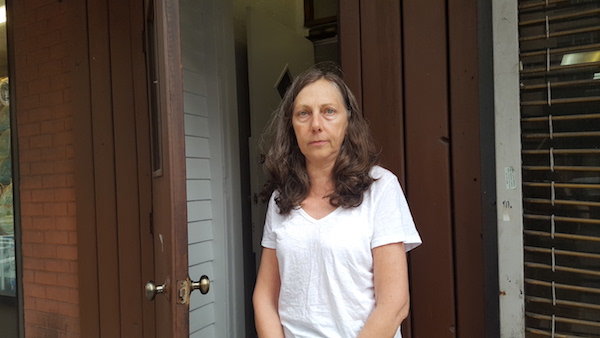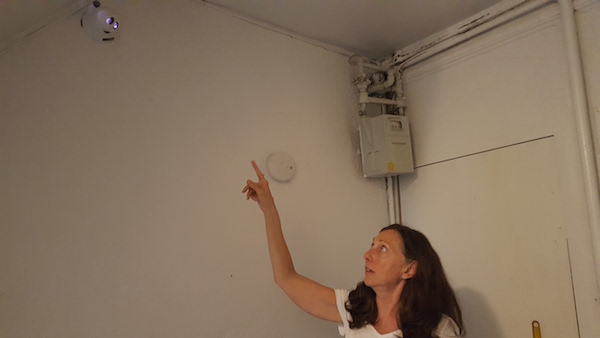
BY DUSICA SUE MALESEVIC | Mold. Flooded basement. Leaks so persistent mushrooms sprouted. Rodents. No heat, hot water, or cooking gas. And this: “I almost had the building demolished with me in it.”
This is a partial list of the burdens longtime tenant Cathy Levan has faced in her apartment since the building’s ownership changed hands two years ago.
It was not always so. When Levan, 54, moved to 940 First Ave. in July 1998, it was a family-owned building with longtime tenants. The four-story mixed-use building between E. 51st and 52nd Sts. was built in 1900, according to StreetEasy.com.
“It’s got a vibrant business downstairs,” Levan told Manhattan Express at her apartment on July 27.
Pisacane Seafood was a well-loved fish shop owned by Joseph Enea, and run with his sons, Paul and Frank, Levan recalled. Enea owned the building as well, using the units right above the shop for his office, she said. There were four units above that, two on each floor. Enea was “a very good landlord” and “everything was amicable,” Levan said.
After Enea died, Pisacane Seafood closed its doors in May 2015, according to Levan and news reports. In the lead-up to the business closing and the sons selling the building, Levan said, “they started telling all the tenants to leave.” The tenants spoke with four different lawyers and “they all thought we had cases to stay.” But two of the units took a buyout from the Eneas, according to Levan.
Levan and her partner, who declined to be interviewed, decided to stay. “The rent-controlled tenant… below me was staying so I just figured if he’s rent-controlled and we’re filing to find out what we are, it should be fine,” she said.
In July 2015, the building was sold for $6.85 million to First Avenue Realty Holdings LP, city property records show. Levan said the new owner, Cheskel Strulovitch, never introduced himself and she engaged the law firm of David Rozenholc, whom Crain’s New York dubbed “the most feared tenant attorney” in an October 2015 article.

Once the property changed hands, trash collection halted and things in the building started to deteriorate, Levan said. Even while two units remained occupied, permits were filed with the city’s Department of Buildings (DOB) for a 14-story, 13-unit, mixed-use building that would rise to 141 feet at the site, 6sqft and others reported in September 2015.
The final other tenant, who did not respond to interview requests, left in February 2016.
For a time, windows in the apartment below Levan’s had no glass, making the unit “pigeon central,” she said. (The windows have recently been fixed.)
“That was just the beginning,” she said.
With heat cut off, pipes in the building froze and then exploded, Levan recalling, “the basement was probably four feet under water. Not to mention, you know, there was water leaking in every apartment below me.” Levan waited seven days to have water restored to her apartment.
Finally this past February, she did hear from Strulovitch via an eviction notice posted on her door. Levan said she had earlier taken the landlord to Housing Court, in November 2015, for “a long list of things” — some were fixed; others not, including “a super mold problem… that they just covered over with new drywall and some insulation without any remediation of the mold. That’s very significant to me because of my health condition. I am a cancer survivor and [have] autoimmune diseases” that are triggered by environmental toxins.
Interior demolition in the vacant units, meanwhile, meant “debris was all over and pieces of the ceiling were falling down,” she said. “We just made do with what we could, the whole 2016, after that major event of the flooding,” Levan said. “And the mold was continuing to grow. It started leaking through the [third floor unit’s] door and spreading like a pool of water into the hallway and there were mushrooms growing … coming out from underneath the door.”
By January of this year, water leaks were getting really bad and workers were ripping up the linoleum in the hallway. “They came in with sanders and just filled the whole building with sawdust, and there were two or three inches of sawdust on all the halls and all the stairs,” Levan said. A camera was also installed outside of her apartment, facing her door.
“It’s definitely abysmal,” Levan said. “It’s not a nice way to live. But it is that way. It’s been that way for so long, I don’t even remember what it feels like not to be living like this.”
On March 30, Strulovitch filed a PW1 form for full demolition of the building, stipulating that it was unoccupied, according to the DOB’s website. Tenant advocates and elected officials have long complained that PW1s often make such false claims, as part of a strategy of construction harassment of holdout tenants.
According to Andrew Rudansky, a DOB spokesperson, after a PW1 is filed, a Building Enforcement Safety Team examines the plan submitted to make sure it meets the city’s construction and zoning codes. A BEST unit then visits the site to see that the plans accurately reflect the building’s condition, including that it is vacant. Rudansky said a demolition permit was never issued for 940 First Ave.

On May 12, after receiving a referral from the FDNY, the DOB inspected the building for lack of fire escape maintenance and the removal of fireproofing material in the basement, Rudansky said. A violation was issued. According to Housing Preservation and Development spokesperson Juliet Pierre-Antoine, a fire guard was appointed to oversee the building because a required second fire exit was compromised by a cinderblock wall. The guard is stationed at Levan’s building 24 hours a day, seven days a week, with both front entrance doors open. Strulovitch is billed for the service.
Sixty open violations for 940 First Ave. appear on HPD’s website and the property has accumulated $20,134 in charges this year, Pierre-Antoine said. DOB inspectors discovered interior demolition being done without a permit on May 16, and issued a full stop-work order, Rudansky said. Fines imposed on Strulovitch for making false statements on the PW1 now total $10,620 for that violation, the DOB spokesperson said.
Peter Stroh, a licensed engineer, who is the applicant for the PW1, was also issued a violation, Rudansky said. In a July 28 phone interview, Stroh said his role was preparing a plan “to safely take down the building.” He said, “We go into occupied buildings all the time,” but did not answer questions about what information the landlord had provided him.
According to East Side State Senator Liz Krueger, Levan’s case is “horrendous and not unique.”
“It’s the same theme: the landlord doesn’t want the muss and fuss of dealing with the law,” she said. “My office is consistently intervening on behalf of tenants.” The DOB, Krueger said, seems to be rubber-stamping documents, though in the case of Levan’s building no demolition order was ever issued. “There’s an assumption that they’re being told the truth,” the senator said.
Rudansky, the DOB spokesperson, said the department is taking steps to modernize its systems to identify falsified PW1s and is rolling out DOB NOW, a “new public facing web interface” according to its website, aimed at increasing transparency for tenants.
“Tearing up a building with residents still living there is outrageous, inexcusable, and illegal,” he said in a later email statement. “Immediately after DOB learned of this illegal work, we issued a stop work order and numerous violations to all parties involved. We will continue to monitor this situation closely.”
Krueger’s office has been working with HPD on Levan’s case. “She has tenant rights — under the law, it is the habitability of the building,” the senator said.
Betsy Eichel, a tenant organizer for Housing Conservation Coordinators for three and a half years, said she has seen this kind of tenant harassment on the West Side, as well.
“Landlords seem to think it is cheaper to get rid of rent-regulated tenants through construction harassment,” she said.
Eichel is part of the Stand for Tenant Safety Coalition, which pushed for the passage of a dozen bills that address construction harassment. The City Council approved the entire package this week.
“They were going to tear it down from the moment they bought it,” Levan said of her landlord’s intentions. “They were already going in that direction.”

Strulovitch indicated on the PW1 that there were no rent-controlled or rent-stabilized apartments in the building. One of Levan’s attorneys, Michael Terk, said the regulatory status of her unit is a whole other battle. The unit, he said, had never been registered as a rent-stabilized unit, but the state’s Division of Housing and Community Renewal is currently determining whether it should have rent-stabilization protection.
Levan is now in Housing Court for a third time — first regarding conditions in her apartment, then in response to the eviction notice, and now again for her living conditions, Terk said. The attorney explained that forcing tenants to shoulder “legal bills with baseless litigation” is a tactic in driving them out. “They have no choice but to give up and leave because they can’t afford to keep going,” he said.
The Housing Court judge has ordered the landlord to pay Levan’s reasonable legal fees for the eviction proceedings, Terk said, though that payment has not been made. He added that the various ways the landlord’s name has appeared in news reports — such as Cheskel Strulowitz and Chaskiel Strulovich — is “not by accident.” It makes it hard to track down his business ventures and assets, the attorney explained.
According to the Real Deal, Strulovitch and his brother, Moses Strulowitz, “own a portfolio of at least 180 apartments in 12 buildings” in Brooklyn. Investors, the news site reported in April, are “accusing landlord Cheskel Strulowitz of a Ponzi scheme that cost them $90 million in damages.”
Neither Strulovitch’s CS Real Estate Group nor his lawyers, TCS Real Estate Group , responded to phone calls or emails requesting comment.
Terk said the resolution Levan is seeking in Housing Court is for all the unlawful conditions to be fixed. Asked whether his client would also seek financial compensation, Terk responded, “We may end up doing so. We haven’t reached that point yet.”
Levan said, “This is our home. I mean that’s it. This is our home. I want to stay in my home.”

















